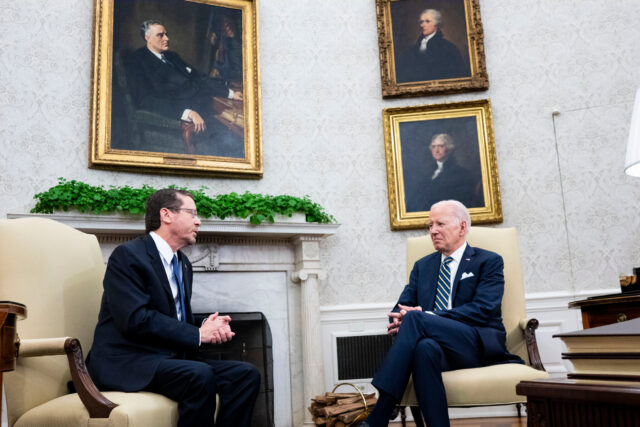The hasty, “save my skin with Jewish voters, please” phone call by President Joe Biden to Israeli Prime Minister Benjamin Netanyahu doesn’t/can’t/won’t undo two years of nasty, ill-conceived slaps at Israel or the disaster of an Iran policy pursued by Biden, his cabinet and his loose-with-classified-information envoy to Iran. The administration has been deep into things that a) are not America’s business (Israel’s judicial reform), b) are probably not America’s business (the security of Israeli citizens in the face of terrorism), and c) are, in fact, relevant to both countries (Iran).
Focusing on the first is pointless. On this second, the US is out of touch with most of the Israeli political spectrum, starting with the center-left and moving right, believing as it does that an independent Palestinian state would solve both the political and the security problem. But even The New York Times notes that, “a growing number of analysts conclude that Palestinian statehood is no longer possible.”
That leaves Iran. The US has been begging and bribing Iran to scale back its nuclear program, and has ignored egregious violations of human rights by the mullahs, including what the UN calls a “horrific wave of executions.” Israel, much more clear-eyed, has announced it will take unilateral steps, if necessary, to secure its people from Iranian threats. Good cop/bad cop? No. A fundamental gap in perception, aggravated by the muddled suspension of US envoy to Iran Rob Malley.
So, where does that leave Israel’s President Isaac Herzog, who is about to address a joint session of Congress? As a national figure, he represents the entirety of the legitimate, democratic State of Israel, not parties or politics. He is in a position to restore attention to the fundamental principles that have given the two countries a relationship grounded not only in security matters, but in philosophical understanding.
He can turn for inspiration to the late Rabbi Lord Jonathan Sacks, who spoke eloquently about the unique relationship. It started, Rabbi Sacks said, with the Jewish people’s biblical demand to have a king.
What happened in the days of the Prophet Samuel is a social contract, exactly on the lines set out by Thomas Hobbes in “The Leviathan.” People are willing to give up certain of their rights, transfer them to a central power, a king, a government, who undertakes to ensure the rule of law internally and the defense of the realm externally…
But what makes the Hebrew Bible… completely different from Hobbes and Locke and Jean-Jacques Rousseau is that this wasn’t the first founding moment of Israel as a nation, as a political entity. That took place at Mount Sinai when the people made with God not a contract but a covenant. And those two things are often confused, but they’re quite different.
In a contract, two or more people come together to make an exchange… A covenant… is more like a marriage… (It) isn’t about me, the voter, or me, the consumer, but about all of us together. Or in that lovely key phrase of American politics, it’s about “We, the people.”
Biblical Israel had a society long before it had a state… And there is only one nation known to me that had the same dual founding as biblical Israel, and that is the United States of America, which has its social covenant in the Declaration of Independence in 1776 and its social contract in the Constitution in 1787.
Covenant is presupposed in the most famous line of the Declaration of Independence… “We hold these truths to be self-evident, that all men are created equal and endowed by their Creator with certain inalienable rights.”
They are self-evident only to people who have internalized the Hebrew Bible.
Thank you, Rabbi Sacks.
That is the center of America’s relationship with Israel. Neither country is perfect on the ground, but we share the same founding principles, the same democratic aspirations, the same respect for the social contract and for the covenant.
As a practical, bilateral matter, that underlying unity has helped Israel move in American eyes from a net security consumer to a net security producer. By its very presence, Israel makes the region more secure.
Israel has welcomed Michael “Erik” Kurilla, Commander of the US Central Command (USCENTCOM), seven times in just over a year, as he works to integrate Israel as a partner, not a minion. With an increase in Iranian threats to shipping in the Strait of Hormuz, the US has increased military operations, meaning more coordination with Israel.
Shared concerns have evolved into shared capabilities and shared opportunities.
So, while President Biden is in a snit over houses for Jews on the West Bank, and certain Democrats slander the democratic State of Israel with the “apartheid” moniker (conveniently ignoring Arab citizens of Israel with full civil rights, and Palestinian residents of the West Bank and Gaza who are governed by the non-democratic Palestinian Authority), and antisemitism has slipped into the halls of the US Congress, Israel and the US military are working to secure our joint interests and, it seems, our joint future.
Our joint interests and our joint future. President Herzog can start there.


